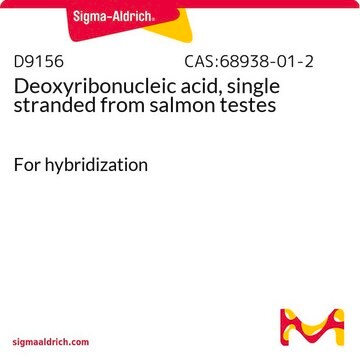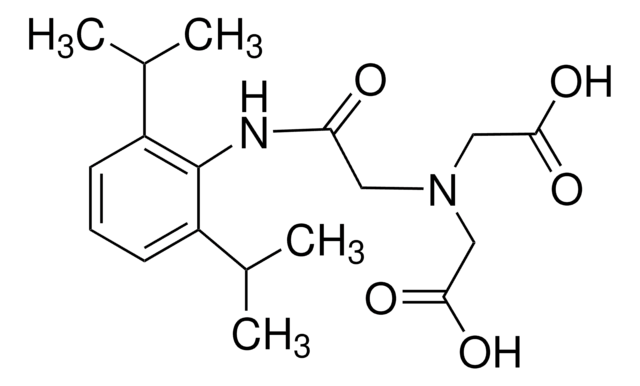L4158
Lithium acetate dihydrate
BioXtra
Synonym(s):
Acetic acid lithium salt
About This Item
Recommended Products
product line
BioXtra
Quality Level
form
solid
impurities
≤0.001% Phosphorus (P)
≤0.1% Insoluble matter
mp
53-56 °C (lit.)
solubility
H2O: 1 M, clear, colorless
anion traces
chloride (Cl-): ≤0.5%
sulfate (SO42-): ≤0.05%
cation traces
Al: ≤0.0005%
Ca: ≤0.005%
Cu: ≤0.0005%
Fe: ≤0.0005%
K: ≤0.005%
Mg: ≤0.001%
NH4+: ≤0.05%
Na: ≤0.005%
Pb: ≤0.001%
Zn: ≤0.0005%
SMILES string
[Li+].[H]O[H].[H]O[H].CC([O-])=O
InChI
1S/C2H4O2.Li.2H2O/c1-2(3)4;;;/h1H3,(H,3,4);;2*1H2/q;+1;;/p-1
InChI key
IAQLJCYTGRMXMA-UHFFFAOYSA-M
Looking for similar products? Visit Product Comparison Guide
General description
Application
Storage Class Code
11 - Combustible Solids
WGK
WGK 1
Flash Point(F)
Not applicable
Flash Point(C)
Not applicable
Personal Protective Equipment
Choose from one of the most recent versions:
Certificates of Analysis (COA)
Don't see the Right Version?
If you require a particular version, you can look up a specific certificate by the Lot or Batch number.
Already Own This Product?
Find documentation for the products that you have recently purchased in the Document Library.
Customers Also Viewed
Articles
Transformation introduces exogenous DNA into cells, a fundamental genetic modification process demonstrated in Streptococcus pneumoniae.
Transformation introduces exogenous DNA into cells, a fundamental genetic modification process demonstrated in Streptococcus pneumoniae.
Transformation introduces exogenous DNA into cells, a fundamental genetic modification process demonstrated in Streptococcus pneumoniae.
Transformation introduces exogenous DNA into cells, a fundamental genetic modification process demonstrated in Streptococcus pneumoniae.
Protocols
Yeasts are considered model systems for eukaryotic studies as they exhibit fast growth and have dispersed cells.
Our team of scientists has experience in all areas of research including Life Science, Material Science, Chemical Synthesis, Chromatography, Analytical and many others.
Contact Technical Service






